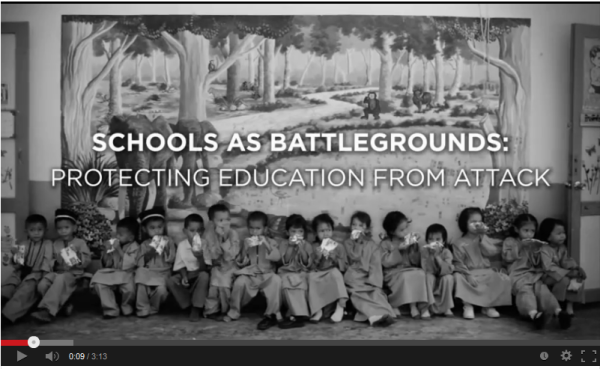October 8, 2011. Article forwarded by the Réseau International Humaniste, member of the GCPEA,
(New York) – One year ago tomorrow, school girl Malala Yousefzai was attacked by the Pakistani Taliban. This somber anniversary is a reminder of the perils that students, teachers, and professors face in areas of conflict and repression around the world, said the Global Coalition to Protect Education from Attack (GCPEA) today.
On October 9, 2012, armed men shot Malala and two of her female classmates as the girls were on their way home from school, badly wounding all three. The teenager was well-known because of her blogs about the importance of education, particularly for girls, on the BBC’s website, which she began writing when she was 11. According to the Taliban, their assault on Malala was retribution for publicly expressing her opinions.
“Malala’s shooting last year was a wakeup call to the world that we cannot wait any longer to stop schoolchildren, teachers, and schools from being used as pawns in political battles and ideological conflicts,” said Diya Nijhowne, director of GCPEA. “We simply should not accept that children are experiencing terror on their way to school and in their classrooms.”
Globally, shootings, bombings, and threats against students and school and university instructors are not unusual events. Neither is the use of school and university buildings for military purposes such as bases, barracks, firing ranges, and detention centers. GCPEA has documented attacks on education in approximately 30 different countriesin the last five years and military use in 24. In the last year, devastating incidents have taken place in Afghanistan, the Democratic Republic of Congo, the Gaza Strip, Iraq, the Philippines, Mali, Nigeria, Somalia, Sudan, Syria, Thailand, and Turkey, in addition to Pakistan, where Malala was attacked.
Recently, on a single day—September 29—40 students reportedly died when members of the extremist group Boko Haram attacked their dormitory at Nigeria’s Yobe State College of Agriculture, and 16 people, mostly students, were killed when an airstrike hit their school in Raqaa, Syria. A week later, on October 6, 14 children and their headmaster died in a suicide attack in northern Iraq when a truck filled with explosives was driven into their schoolyard.
Attacks like these are not just a side-effect of war. Students, teachers, academics, and the schools and universities they work and study in, are directly targeted as a political and military tactic—because they are viewed as symbols of the state, because of opposition to educational content or schooling for girls, or in retaliation for perceived support of opposing forces.
“It is egregious that students, teachers, and classrooms are the direct targets of violence, while those responsible too frequently walk free,” said Nijhowne. “We urge states, militaries and nonstate armed groups, international agencies, and communities to prevent attacks on education in all places where they occur—and to hold those responsible to account.”
GCPEA called on states to criminalize attacks on education and hold perpetrators accountable; donors and implementing agencies to support protective projects and programs; armed forces and groups to refrain from attacking schools or using them for military purposes; and governments to endorse and implement the Draft Lucens Guidelines for Protecting Schools and Universities from Military Use during Armed Conflict—developed by GCPEA, in collaboration with states, United Nations agencies, and non-governmental organizations—which are intended to strengthen protection of schools and universities during military operations.
“Malala was attacked because she represented values that the Taliban associates with the Pakistani government and opposes,” said Nijhowne. “It is within the power of the world community to make sure that education and school children are kept out of these battles. If one young school girl can stand up to violence, so can we.”
For further information, please contact:
Diya Nijhowne, Director, Global Coalition to Protect Education from Attack: +1-212-377-9413, dnijhowne@
The Global Coalition to Protect Education from Attack (GCPEA) is a unique coalition of leading international organizations including CARA (Council for Assisting Refugee Academics), Human Rights Watch, the Institute of International Education- IIE’s Scholar Rescue Fund, Protect Education in Insecurity and Conflict, Save the Children International, the Scholars at Risk Network, UNESCO, UNHCR, and UNICEF. GCPEA is a project of the Tides Center, a nonprofit 501(c)(3) organization.
Please visit our website at www.protectingeducation.org
350 Fifth Avenue, 34th Floor
New York, NY 10118-3299
1.212.377.9446
Copyright © 2013 Global Coalition to Protect Education from Attack, All rights reserved.
You are receiving this email from GCPEA.






